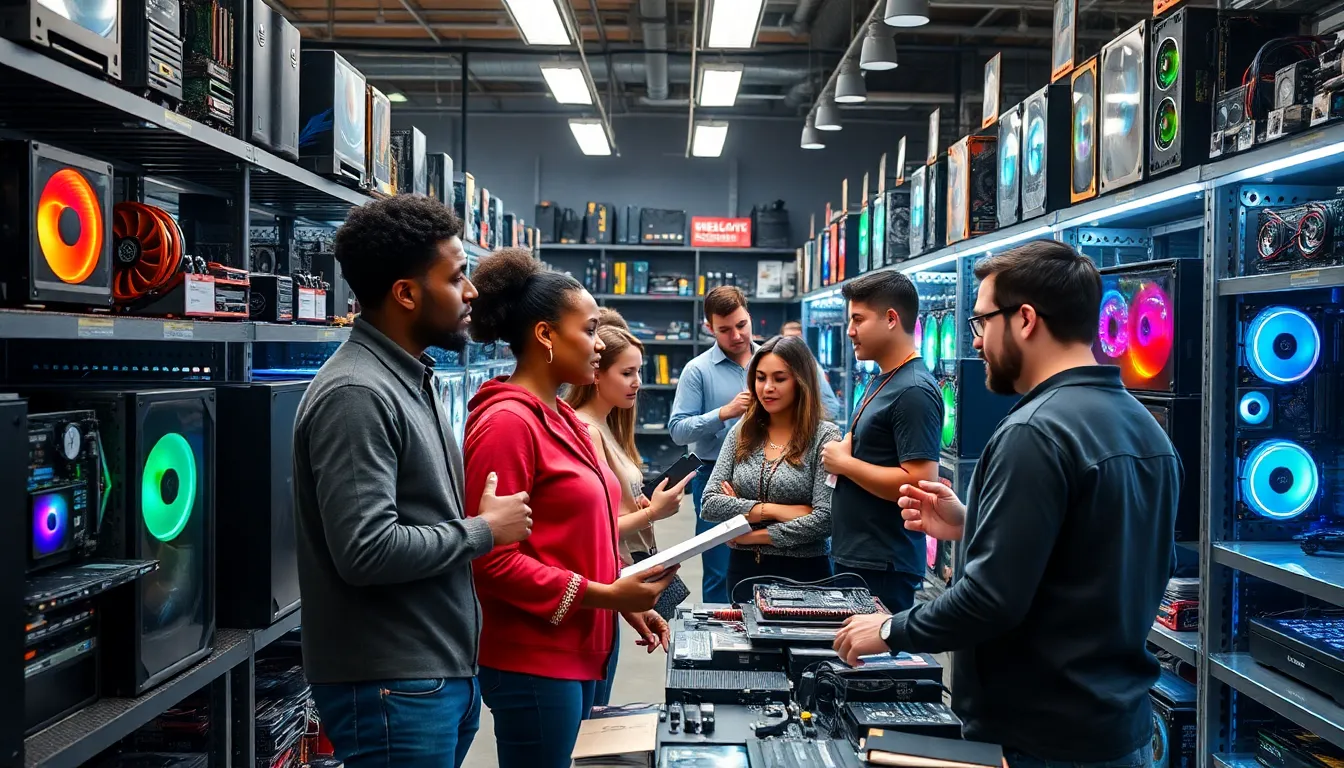In today’s digital age, computer hardware stores play a crucial role in keeping technology enthusiasts and everyday users connected. These stores offer everything from essential components to the latest gadgets, catering to a diverse range of needs. Whether someone’s building a custom PC or upgrading their existing setup, the right hardware can make all the difference.
With a myriad of options available, finding a reliable computer hardware store can be overwhelming. Shoppers seek not only quality products but also knowledgeable staff who can provide guidance and support. This article explores the landscape of computer hardware stores, highlighting what to look for and how to make informed choices, ensuring every tech-savvy individual finds the perfect fit for their needs.
Table of Contents
ToggleOverview of Computer Hardware Stores
Computer hardware stores provide essential products for technology enthusiasts and everyday users. They typically offer a range of items, including:
- Components: Motherboards, processors, graphics cards, and memory, necessary for building or upgrading PCs.
- Peripherals: Mice, keyboards, monitors, and printers that enhance user experience.
- Accessories: Cables, cases, and cooling systems, enabling optimal equipment performance.
- Networking Equipment: Routers, switches, and modems for establishing reliable internet connections.
- Storage Solutions: Hard drives, SSDs, and external storage options that manage data effectively.
Customers seek stores with knowledgeable staff who can assist with product selection and troubleshooting. Quality products at competitive prices attract diverse clientele. Many stores also provide online purchasing options, expanding access beyond local communities.
Additionally, some stores offer services such as custom builds, repairs, and tech consultations, catering to specific user needs. These features foster customer loyalty and promote long-term relationships with technology users.
Types of Computer Hardware Stores

Computer hardware stores come in various formats, each catering to specific customer needs. Understanding these types aids in selecting the right store for computing requirements.
Retail Locations
Retail locations offer in-person shopping experiences. They stock a wide range of hardware components and peripherals, allowing customers to physically inspect products. These stores often employ knowledgeable staff who can provide advice on product compatibility and performance. Retail locations may also host events like workshops or tech demos to engage their communities. Examples of popular retail chains include Micro Center and Fry’s Electronics, which provide local availability of hardware and quick access to customer support.
Online Stores
Online stores offer convenience and accessibility. Customers can browse extensive catalogs of hardware components and peripherals from anywhere with an internet connection. Online retailers typically feature user reviews, which help shoppers compare products and make informed decisions. Many established online stores, such as Newegg and Amazon, provide competitive pricing and options for quick delivery. Additionally, online platforms often offer customer service via live chat or email assistance, ensuring prompt support for product inquiries and troubleshooting.
Key Components Available in Computer Hardware Stores
Computer hardware stores offer a wide array of essential components necessary for building and upgrading computers. Key components include processors, graphics cards, and motherboards, each playing a crucial role in system performance and capabilities.
Processors
Processors serve as the brain of a computer, executing instructions and managing tasks. They come in various specifications and architectures, with popular brands like Intel and AMD leading the market. Shoppers can choose from options ranging from budget-friendly models for basic computing to high-performance processors designed for gaming or professional applications.
Graphics Cards
Graphics cards manage rendering tasks, significantly influencing visual performance. Choices range from integrated graphics solutions for everyday tasks to dedicated graphics processing units (GPUs) for gaming and graphic design. Leading manufacturers like Nvidia and AMD offer various models that cater to different use cases, including gaming at 4K resolution and content creation.
Motherboards
Motherboards serve as the backbone of a computer, connecting all hardware components. They vary by form factor and chipset, accommodating specific processors and ports for expansion cards, RAM, and storage devices. Users can select motherboards with features like integrated Wi-Fi, multiple USB ports, and support for overclocking, ensuring compatibility and enhanced performance based on their needs.
Factors to Consider When Choosing a Computer Hardware Store
Selecting the right computer hardware store involves several critical factors. Buyers must evaluate pricing, customer service, and warranty policies to make informed decisions.
Pricing and Selection
Pricing influences choice significantly. Hardware stores often feature varying prices across brands and models. Buyers should compare prices for essential components like processors, graphics cards, and storage devices to identify the best value for their needs. Selection also matters. Stores that offer a wide range of products, including the latest technology and popular brands, better cater to diverse customer requirements. Demanding items like high-performance GPUs and specialized motherboards should be readily available to meet varied project demands.
Customer Service
Customer service plays a vital role in the shopping experience. Knowledgeable staff can provide essential information about products and help troubleshoot issues. Stores that offer personalized assistance enhance customer satisfaction. Efficient communication channels, whether through in-person interactions or online chats, reflect commitment to customer care. Quality customer service fosters loyalty, encouraging repeat business and referrals.
Warranty and Returns Policy
A clear warranty and returns policy protects buyers’ interests. Stores that offer warranties for their products demonstrate confidence in their quality. Buyers should look for policies that provide reasonable return periods and easy return processes for faulty or incompatible items. Transparent terms build trust and provide peace of mind when investing in computer hardware, ensuring customers feel secure in their purchases.
Computer hardware stores play a vital role in the tech ecosystem by providing essential components and support for both enthusiasts and casual users. The variety of products available ensures that customers can find the right solutions for their specific needs. Whether shopping in-store or online, the focus on quality service and knowledgeable staff enhances the overall experience.
As technology continues to evolve, these stores will remain crucial for anyone looking to build, upgrade, or repair their systems. By considering factors like pricing, customer support, and product selection, shoppers can make informed decisions and foster long-lasting relationships with their favorite hardware retailers.


